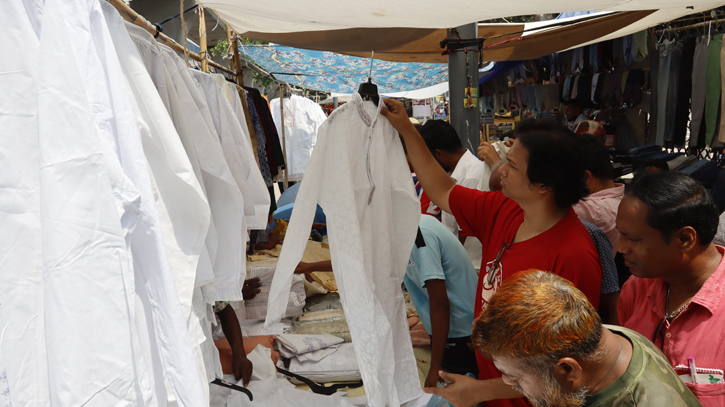
Photo : Messenger
Eid-ul-Fitr is just around the corner. In the days leading up to Eid, shops selling clothes, shoes, and ornaments are bustling with activity. From early morning, clothing stores are swarmed with customers. As the day wears on, the crowds spill over to shoe stores and shops selling other Eid essentials. Vendors expect this surge in customers to continue until the night of the Eid moon sighting.
Moreover, footpath markets catering to the middle-class populace of the capital have witnessed a significant influx of buyers compared to regular days, especially in the run-up to Eid.
Buyers, sellers, and economists said that overall people don’t have much money now. Due to the increase in commodity prices, common people are struggling to meet their daily needs. In this situation, shopping for Eid is becoming difficult for many people.
In that case, many middle-class people are now buying various clothes and shoes for their family members from the pavement. However, the previous scene is not seen even on the footpath. Instead of bargaining for lower-class clothes at a lower price, the middle class buys them at fixed prices from most of the shops on the footpath. As a result, Eid shopping has become beyond the reach of the lower classes.
Bangladesh Shop Owners Association President Md Helal Uddin told The Daily Messenger, “Traders are facing various obstacles, including price inflation, a dollar crisis, and a halt in the import of raw materials and capital equipment. The price of everything has increased; meanwhile, people’s income has decreased. In general, people are living in terrible conditions, and their financial situation is not good, resulting in very low sales.”
A buyer named Popy from the Basila area of Mohammadpur came to the New Market area of the capital with her mother for Eid shopping. But after six hours of wandering, they could not find any clothes within their budget, so they had to return empty-handed. Popy and her mother are now planning to do Eid shopping from the sidewalk shops.
Expressing her disappointment with the high price of clothes, Popy said, “The shopping malls are selling everything at high prices. If you like something, you don’t like the price. Last year, a one-piece dress could be bought for between Tk 400-500; now, the price of this type of dress has increased by Tk 100-200 per piece.”
Saidul Islam, who sells shirts in front of Aysha Complex in Mouchak, said that it is not possible to sell to low-income people due to the increase in the price of clothes. Consequently, sales have also decreased. He said, “Eid is approaching, and there should be selling pressure, but sales are not happening. Buyers come, show interest, but leave upon hearing the price.”
He mentioned that he cannot keep the price of clothes low because he has to buy them at a high price. Last year, the average price of a t-shirt was Tk 180; now, they have to be bought wholesale at Tk 250. If customers are told the price of Tk 300, they want to pay less than the purchase price.
Shopkeepers have been busy with Eid sales lately, but this year sales are still about 50 percent less than last year, traders said. This year, there have been no sales even after 20 Ramadan. Arefin, who sells kids wears on the sidewalk in front of Mouchak Market, said that last year, during Ramadan, around Tk 40,000 was sold each day. Now only Tk 7to 8 thousand are being sold.
In this regard, Lovely Yasmin, president of Bangladesh Readymade Garments Workers Federation, told The Daily Messenger, “Many small industries, including garments, have closed before Eid. The restaurants closed a few days ago. Several lakhs of workers have become unemployed. There is no Eid for those people who have lost their jobs. Therefore, the presence of low-income people on the sidewalk is less.”
On the other hand, many middle-class individuals have been affected by the corona pandemic. After the dollar crisis, the import of raw materials stopped, and many small traders halted their business due to defaults. The situation is such that they cannot even ask people. They are not even getting new loans from banks for business. So, their place of hope for Eid is the footpaths of the capital, she added.
Meanwhile, the presence of buyers in high-end markets like Bashundhara City indicates that the Eid shopping of the affluent is piling up. This time, buyers are emphasising on cotton clothes by giving preference to summer wear. Tk 4-15 thousand must be counted for local brands to buy Panjabi. In the case of sarees, prices have reached up to Tk 6-50 thousand. However, cotton one-piece and three-pieces are more popular. When it comes to shoes, comfortable slippers top the list of preferences.
However, several businessmen said that their sales have decreased due to the increasing popularity of online shopping. Now, many people are doing more shopping online. Besides, many sellers claim that their sales are low due to the late payment of salaries in private institutions.
A businessman named Yamin Hossain of Bashundhara City Shopping Mall said that sales are lower compared to the previous year due to the increase in prices. Now, how do people buy when the price of everything is almost double? However, he expressed hope that sales will increase in the last few days as general employees receive their salary and bonus.
Traders said that electricity bills, shop rent, and other incidental expenses have increased, so everything has to be added to the price of clothes. That’s why the price has to be higher than in other years. A clear picture of inflation in the country is emerging from the words of businessmen. According to the government, inflation in the country has been close to 10 percent for the last two years. Besides, the prices of some essential commodities have increased by 50-60 percent, although people’s incomes have not increased by more than 5 percent.
Messenger/Disha








